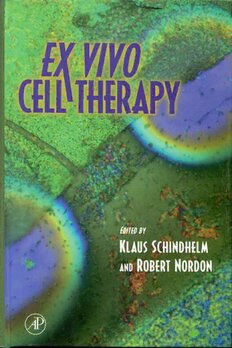
Ex Vivo Cell Therapy PDF
354 Pages·1999·21.217 MB·English
Most books are stored in the elastic cloud where traffic is expensive. For this reason, we have a limit on daily download.
Preview Ex Vivo Cell Therapy
Description:
Over the last two decades advances in the understanding of disease at a cellular and molecular level has led to innovative therapies that are based on the administration of cells which have been modified outside of the body. Ex vivo cell therapy is in essence gene therapy delivered by transfer of therapeutic genes to cells in culture, which are then given to the patient to treat fatal infections such as AIDS, or other conditions such as cancer or genetic diseases. These manipulations include the purification and culture of therapeutic cell subtypes, as well as elimination of cells which cause disease (cancer cells or immune cells reacting to the body itself). Gene therapy can be delivered by transfer of therapeutic genes to cells in culture, which are then given to the patient to treat fatal infections such as AIDS, cancer or genetic diseases. For small-scale laboratory methods to become clinically applicable processes, these new therapies require efficient technologies for cell separation, cell production in culture and gene transfer. This book integrates the recent advances in biological and clinical research with developments in cell-based technologies to provide a comprehensive review for clinicians, researchers, biotechnologists and biomedical engineers working in this rapidly developing area. The biotechnology and pharmaceutical industry requires a broad perspective for development of future technologies, and this text will provide then with an excellent overview of this rapidly evolving field. Key Features* Comprehensive review by leading researchers* Hematopoietic stem cell development: transcriptional control, signaling pathways, hematopoietic growth factors and adhesion molecules* Clinical developments: hematopoietic stem cell transplantation, cellular immunotherapy and gene therapy* Enabling technologies: cell separation, bioreactors, and gene transfer regulatory issues
See more
The list of books you might like
Most books are stored in the elastic cloud where traffic is expensive. For this reason, we have a limit on daily download.
